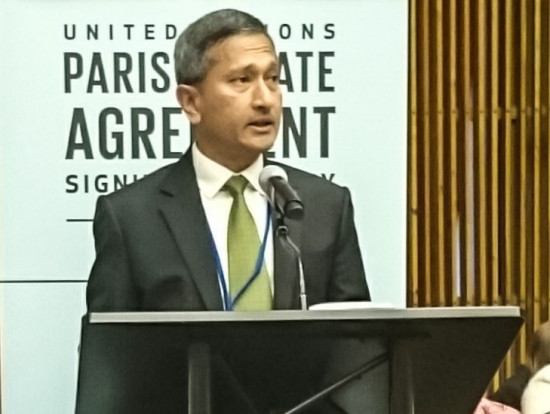23 Apr 2016

Excellencies,
1 It is very apt that we are here on Earth Day to celebrate the Paris Agreement, and that more than 170 of us will be affixing our signatures to the Agreement on behalf of our respective countries. This is an agreement that will safeguard the future of our planet. It is an agreement that will help us transform our paradigm of development to one that is based on long-term considerations rather than short-term exploitations. To one that is based on justice for all rather than exploiting the weak and the vulnerable. And to a paradigm that we aim for global resilience rather than to gamble with our children’s future.
Significance of the Paris Agreement and Increasing Ambition over Time
2 The significance of this agreement goes far beyond just the environment and climate change. Singapore is a small country, is a staunch supporter of a rules-based multilateral system. The Paris Agreement is a strong affirmation that diplomacy is essential and capable of solving problems on the global commons. And we want to thank the Government of France for their leadership and for the efforts of every one of you who has put so much time and effort to make it all possible.
3 We should maintain the positive momentum generated in Paris and ensure that all the preparations, both domestic as well as that at the UNFCCC, are completed swiftly. At the same time, we all need to remember that we have to take decisive pre-2020 actions in order to create a solid foundation for our post-2020 commitments. Singapore will work with all partners to ensure that this post-Paris work programme is launched effectively.
Singapore’s Efforts
4 Domestically, Singapore will continue our efforts to honour our Copenhagen pledge, which builds the base for our NDC (nationally determined contributions). Given our early actions, Singapore today generates relatively low carbon emissions per GDP dollar, ranking 123rd in emissions intensity out of 142 countries worldwide[1]. Nevertheless, we will continue to do more. Within the geographical constraints we face, we will pursue renewable energy in the form of increased solar PV deployment. This will supplement our substantial energy efficiency efforts and other mitigation measures to lower our Emissions Intensity by 36% from 2005 levels, and to stabilise our emissions around 2030. We take our pledge seriously, and will now turn to making the necessary domestic preparations to enable us to ratify the agreement and to achieve the objectives under our NDC.
Synergies with the SDGs
5 The high-level thematic debates this week have focused on synergies between the SDGs (sustainable development goals) and the Paris Climate Change Agreement. Indeed there is a high degree of symbiosis, but we have to take care to get the relationship right. At the national level, planning our sustainable development pathways well will bring long term benefits for climate safety. But the reverse also holds true.
6 The challenge for many developing countries is to achieve coherence in our public policies and measures, reconcile different objectives, and, where needed, to achieve clearer articulation of the exact needs for external support. The NDC cycle under the Paris Agreement provides all countries, especially developing countries, with the regular opportunity to do this. When we plan for our next NDC, we are forced to re-examine our policy objectives, consider existing circumstances, review effectiveness of past measures, and then plan to do better in the next lap. This provides the prime opportunity to align our SDG and climate action objectives and produce a coherent national action plan to tackle both issues – neither should be at the expense of the other.
Conclusion
7 Paris has been an occasion where we all faced difficult conversations. But it also showed that if it was held in an open and transparent environment, we could achieve a balanced and inclusive outcome. And the way we managed to set aside our contentious and confrontational issues was indeed a wonderful achievement. So we have proven that an agreement can be built on a spirit of cooperation and collaboration. And that there is a pathway to raise ambition, to enhance global support for climate action, and to improve over time.
8 So I want to end by thanking especially the Government of France, especially the efforts of Laurent Fabius and Laurence Tubiana, and their many colleagues for bringing us all together and making this possible. If we remember and we can uphold the spirit of Paris, then I think we can prove to the rest of the world on this and many other issues, we can succeed and can make this world a better place. Thank you very much.
[1] Source: OECD/IEA Energy Statistics, 2015.
. . . . .
MINISTRY OF FOREIGN AFFAIRS
SINGAPORE
22 APRIL 2016